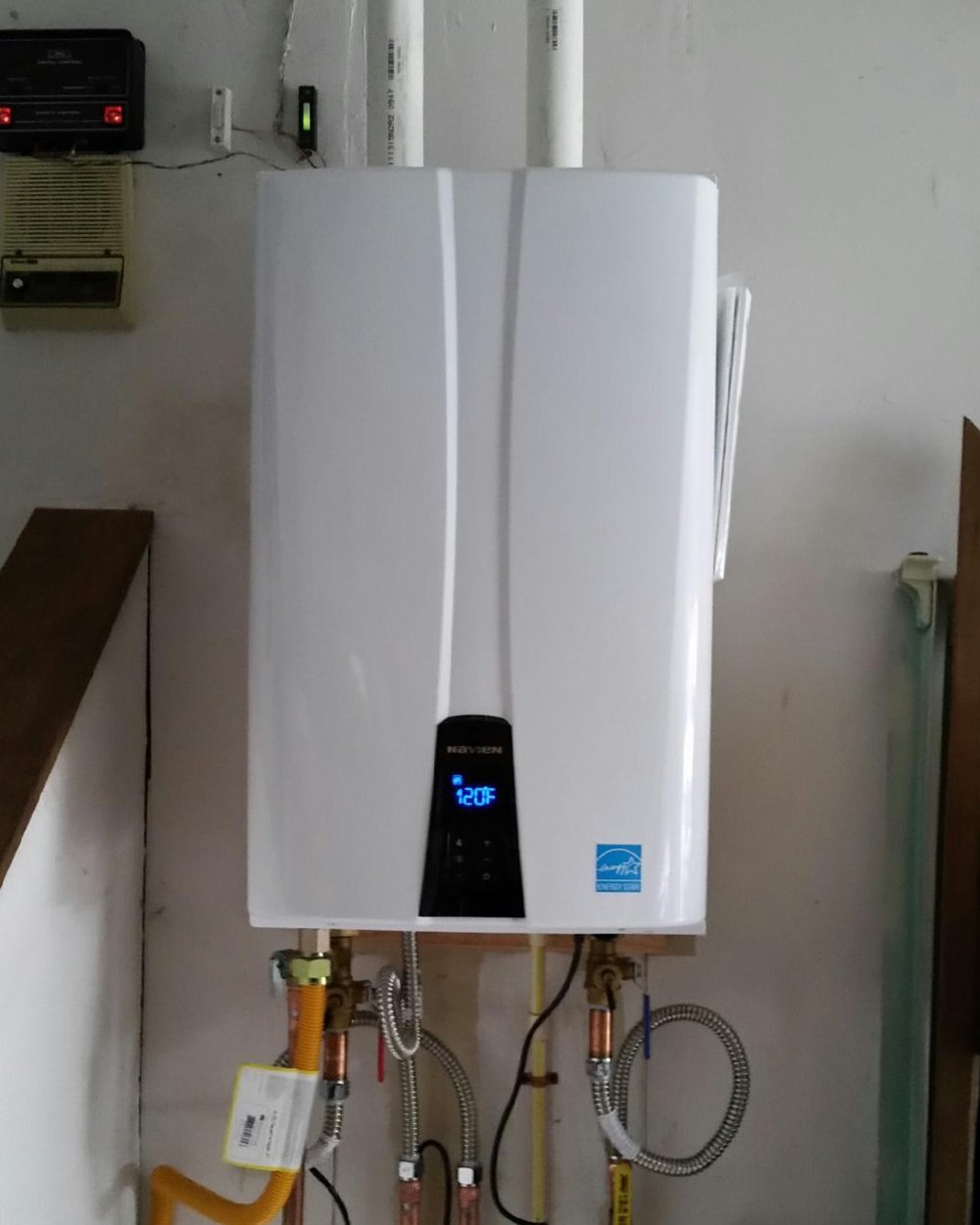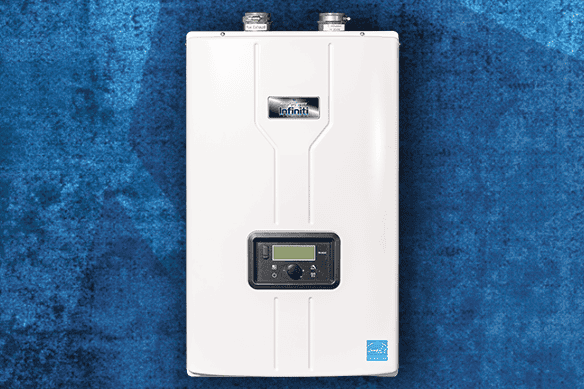We've encountered this post pertaining to 5 Benefits of Tankless Water Heaters below on the web and accepted it made sense to discuss it with you in this article.

In a world where comfort and effectiveness preponderate, it's not a surprise that house owners are continuously looking for smarter ways to handle their home's energy consumption and comfort. One technology that has progressively obtained appeal is the tankless hot water heater. However exactly what makes these systems stand apart from the standard tank-based versions the majority of us matured with? Let's dive in and check out the benefits of tankless hot water heater, aiding you decide if it's time to make the button in your house.
Intro
Picture this: you step into the shower after a long day, expecting a soothing waterfall of warm water, only to be welcomed by icy beads since the last person used all of it up. Noise acquainted? Standard hot water heater save a fixed amount of hot water, indicating you go to the mercy of that tank's supply. Tankless systems, on the other hand, heat water on demand. Say goodbye to running out mid-shower, no more fumbling with routines simply to make sure hot water is readily available.
Recognizing Tankless Water Heaters
What Are Tankless Water Heaters?
Tankless hot water heater, sometimes known as on-demand or instant water heaters, provide hot water only as it's needed. Rather than saving gallons of pre-heated water, these systems kick right into activity the moment you turn on the tap. Water goes through a warmth exchanger, warming up in real-time, indicating you obtain an undisturbed flow of hot water without the demand for a huge tank resting lazily by.
Just how Do They Vary from Standard Equipments?
Conventional heating systems hold a reservoir of hot water, using energy to maintain that container at a constant temperature level. Tankless units get rid of the standing supply, lowering wasted energy and the cumbersome impact of a big cylinder. Essentially, you're upgrading from a "stockpile" attitude to a "made-to-order" strategy.
Common Types of Tankless Systems
Tankless water heaters usually are available in two selections: gas and electrical. Gas versions tend to deliver greater flow rates, suitable for bigger houses, while electric models usually serve smaller sized homes and are commonly easier to mount. In addition, some systems are developed for point-of-use (offering one fixture) while others can take care of the entire home's hot water requirements.
Key Advantages of Tankless Water Heaters
1. Countless Hot Water Supply
Ever before had to set up showers so everyone gets their fair share of warm water? With tankless, that becomes a thing of the past. As long as the heater's circulation capacity isn't exceeded, you can take back-to-back showers without turning into a popsicle.
2. Power Performance and Price Financial Savings
No more heating a giant tank's worth of water and maintaining it warm all the time. Tankless heating units reduce standby power losses, which can lower utility costs. While the preliminary price could be greater, the long-term cost savings commonly warrant the investment.
3. Space-Saving Style
If your home is short on storage, removing the bulky tank frees up important space. Tankless systems are compact and can commonly be placed on wall surfaces, tucked away in edges, or mounted in tight utility storage rooms without having all to oneself the whole area.
4. Longer Lifespan
A properly maintained tankless water heater can outlive its tank-based cousin. Standard containers could last 10-15 years, while tankless models can keep chugging along for two decades or more, making them a strong financial investment gradually.
5. Improved Water High Quality
Storing water in a container can occasionally cause sediment buildup or a slightly "off" taste. With tankless systems, fresh water is heated up instantly, minimizing the chances of sediment buildup and potentially providing cleaner-tasting water.
Considerations Prior To Switching
Though the benefits are compelling, it's a good idea to take into consideration a few factors prior to completely dedicating.
Preliminary Investment Prices
Tankless heating units usually include a higher in advance price tag. Between the unit itself and potential installation alterations, the initial expense might offer you sticker shock. But remember to watch it as a lasting financial investment.
Setup Requirements
Relying on your home's framework, you could require extra electric capability or gas line upgrades. Guarantee you recognize the setup requirements and talk to a specialist to stay clear of shocks.
Evaluating Your Home's Water Usage Patterns
If your household at the same time utilizes several fixtures with high hot water need, make certain the system's circulation rate fulfills your needs. Recognizing your usage patterns aids you pick the appropriate dimension and sort of tankless heating system.
Upkeep and Treatment Tips
Tankless systems are fairly reduced maintenance, but they aren't set-it-and-forget-it devices.
Regular Cleansing and Descaling
Hard water minerals can build up in the heat exchanger, influencing performance. Routine descaling (usually advised each year) maintains the device running at peak performance.
Yearly Professional Inspections
A yearly checkup from an expert makes sure small problems are captured early. They'll evaluate the device's performance, try to find leaks, and help preserve ideal efficiency.
Making Certain Proper Ventilation
For gas models, correct air flow is vital to securely remove exhaust gases. Ensure airing vent systems are tidy and correctly mounted to prevent any type of prospective safety and security threats.
Contrasting Different Brands and Designs
Not all tankless water heaters are developed equal.
Researching Trusted Suppliers
Try to find reputable brand names with a background of creating quality devices. A reputable manufacturer often supplies better client assistance and longer warranties.
Checking Out Evaluations and Customer Comments
Individual evaluations and feedback from neighbors or friends that have actually gone tankless can use beneficial understandings. Sometimes, real-life experiences can be much more telling than advertising brochures.
Setup: Do It Yourself or Professional?
While some property owners enjoy dealing with tasks themselves, tankless installment could not be the most effective time to burst out the toolbox.
Advantages and disadvantages of DIY Setup
A do it yourself set up could conserve money, yet it comes with dangers. Inaccurate setup can bring about inadequacy or security issues. If you're handy and have experience, it might be viable-- however wage caution.
When to Call an Expert Plumber
For most, calling a professional makes certain whatever's done properly. A professional plumbing professional comprehends neighborhood codes, sizing needs, and airing vent criteria, lowering the danger of incidents.
Maximizing Performance
You've bought a tankless system-- now optimize its performance.
Optimal Temperature Settings
The majority of people set their units between 120-140 F. Adjusting the temperature can enhance comfort and savings. Experiment to find a wonderful place that does not squander energy.
Coupling With Low-Flow Fixtures
Want to stretch your device's capabilities? Think about setting up low-flow showerheads and taps. They decrease water usage, allowing your tankless system to supply a consistent stream of hot water without stressing.
Environmental Influence
Tankless water heaters straighten with greener living goals.
Reduced Carbon Footprint
By utilizing less power and only heating water as required, tankless systems can lower your home's carbon footprint, decreasing your ecological influence.
Preserving Natural Resources
Much less power usage and less lost hot water convert right into fewer natural resources being utilized, an ecological win-win.
Who Benefits Many from Tankless Heating units?
The elegance of tankless heating units is that they can fit a range of houses.
Huge Families vs. Single Residents
Big households may enjoy the endless warm water supply, while single owners appreciate the energy savings from not heating up an entire storage tank for just one person's morning shower.
House Owners with Minimal Area
If your home is short on square video, losing the large storage tank maximizes space for various other essentials-- or maybe simply more elbow room.
Eco-Conscious Consumers
Going tankless aligns with environmentally friendly worths, guaranteeing you're not wasting energy or sources.
Future Fads in Tankless Water Heaters
The world of home devices is ever-evolving, and tankless water heaters are no exception.
Smart Home Combination
Envision readjusting your water heater's temperature through an application or getting upkeep alerts on your phone. As smart home tech breakthroughs, we'll see more connection and ease.
Developments in Technology
R&D is continuously improving heat exchangers, making systems extra effective and resilient. Future designs could be also quieter, extra small, and far better suited for varying climates.
Verdict
Selecting a tankless water heater is more than just updating your home's warm water system; it's buying long-lasting comfort, energy effectiveness, and a greener way of living. By considering your household's water usage, bearing in mind setup needs, and committing to regular upkeep, you can enjoy a steady stream of warm water without the baggage of a large container. As technology progresses, you can eagerly anticipate also smarter, much more efficient tankless options that not only make your life easier but additionally profit the planet.
Why You Should Consider a Tankless Water Heater for Your Home
Energy Efficiency and Cost Savings
Tankless water heaters, also known as on-demand water heaters, heat water only when needed. This means they don't waste energy keeping a tank of water hot constantly. This efficiency translates into substantial cost savings on your monthly energy bills.
Endless Hot Water Supply
One of the significant advantages of tankless water heaters is their ability to provide a continuous supply of hot water. Traditional tank water heaters have a limited capacity and can run out of hot water, especially during peak usage times. In contrast, tankless water heaters can provide an endless stream of hot water, making them ideal for larger families or homes with high water usage.
Space-Saving Design
Tankless water heaters are compact and take up significantly less space compared to traditional tank heaters. They can be installed on walls, under cabinets, or even outside, freeing up valuable space in your home. This makes tankless water heaters a great option for smaller homes or properties with limited space for a traditional water heater.
Longer Lifespan and Lower Maintenance
Tankless water heaters typically have a longer lifespan compared to traditional tank heaters. They can last up to 20 years or more with proper maintenance. Additionally, tankless systems are designed with replaceable parts, which can extend their lifespan further and reduce long-term maintenance costs.
Environmentally Friendly
Reducing energy consumption not only saves you money but also benefits the environment. Tankless water heaters contribute to a smaller carbon footprint by using less energy to heat water. Their energy efficiency and ability to minimize standby heat loss make them an eco-friendly choice for environmentally conscious homeowners.
Customized Temperature Control
Tankless water heaters offer precise temperature control, allowing you to set the desired temperature to meet your specific needs. This level of customization ensures you always have water at the perfect temperature for your comfort and usage requirements.
https://beantownservices.com/blog/consider-tankless-water-heater-for-your-home

Hopefully you enjoyed reading our post on Six Benefits of a Tankless Hot Water Heater. Thank you for taking a few minutes to browse our piece. Those who liked our page plz consider to pass it around. Bless you for your time. Don't hesitate to pay a visit to our website back soon.
At This Website
Comments on “Showing The Pros Of Instant Water Heaters”